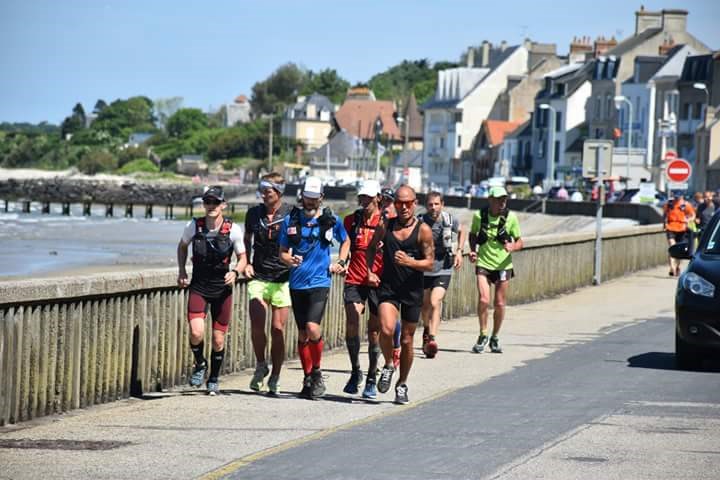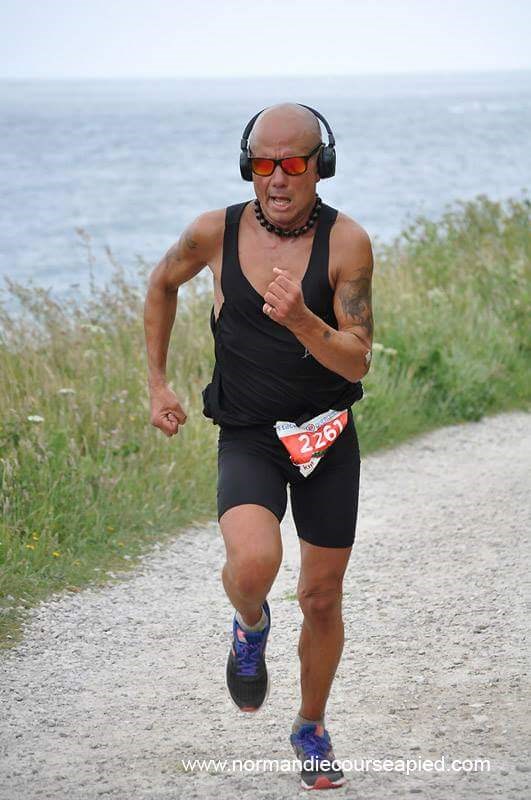What a difference a few months can make.
The last time Squamish readers heard from local endurance athlete Jason Loutitt, it was in April in a letter to The Chief that he penned to apologize to the community for his previous addiction-induced destructive behavior.
Loutitt acknowledged in his letter that he had suffered a “bad addiction to meth over the past few years.”
Fast forward and Loutitt, 44, is currently in France, clean and healthy — save for an ankle injury he is nursing.
He ran the LaBarjo Trail 50-kilometre trek in Normandy on June 17.
Before that, he ran the race that brought him to France in the first place — the 70-kilometre (44 mile) D-Day 44 Challenge. A run he first completed in 2014.
Going forward, he is keeping busy with other running-related events.
He is focused next on representing Canada at his 12th world championship event, the IAU 100K World Championships 2018 in Croatia on Sept. 8.
Then, in the middle of September, he is headed to California for a reunion of the Blue Planet Run team that he ran around the world with in 2007.
Loutitt, who is Metis, said there is also talk of him being inducted into the BC Sports Hall of Fame’s Aboriginal Sport Gallery.
The ups and downs and isolation of his running career have previously led him back to drugs, he said, but he’s working to break that cycle by being raw and truthful.
“I am hoping to help increase my power by sharing truthfully and not just helping me, but maybe helping others with the issue,” he said. “Now I find myself focusing on being truthfully powerful for the first time in my life.”
He pointed to research over the past few years that has suggested deeper human connections can help battle addiction.
He also wants to put out a warning for others in light of cannabis becoming legal in Canada this fall. Pot was never a gateway drug for him, but while high he made some bad decisions, a possibility for others that should be considered as legalization dawns, he said.
Loutitt is planning to come back to Squamish, as his son is here, but he wants to be prepared with a job and place to live.
“I was getting concerned about having to come back without a plan,” he acknowledged.
Those in charge of the D-Day run flew him to France and while there he has traded yoga teaching and other side jobs for room and board.
He is a trained as a Pilates instructor and personal trainer and has worked as a writer, designer, and artist.
“I am just going to take everything I have learned either good or bad and try to apply it,” he said.
While less talked about amidst the opioid crisis, health officials have been watching a rising tide of addictions to the stimulant methamphetamine in this province.
Meth was one of the top four detected drugs found present in illicit drug overdose deaths in 2016/2017, according to stats from the BC Coroners Service.
Fentanyl was detected in 74 per cent of illicit drug overdoses; cocaine was found 49 per cent, methamphetamine/amphetamine, 32 per cent, and heroin 25 per cent.
From his experience, Loutitt suggests anyone ready to address a meth addiction find someone safe to talk to.
“Detox someplace safe with safe people,” he said. “Vancouver detox saved my life along with caring people at the Helping Hands shelter. Book a detox bed and in the meantime stay safe by asking someone else to help you stay safe and away from unsafe people.”
Going to a local counselling service such as Squamish Mental Health also can help, he said.
The public stigma around addiction doesn’t help those suffering, he stressed.
“Save your life and prove the haters wrong,” is his message to those battling addiction.
If you or someone you know is struggling with addiction, there is help:
Alcohol and Drug Information and Referral Service
This service is available to people across B.C. needing help with any kind of substance use issues 24 hours a day. It provides information and referral to education, prevention, and treatment services and regulatory agencies.
Toll-Free: 1-800-663-1441
Lower Mainland: 604-660-9382
HealthLink BC
HealthLink BC helps you learn about health topics, check your symptoms and find the health services and resources that you need for healthy living. Call 8-1-1 to consult with a nurse, pharmacist or dietitian or visit HealthLinkBC.ca for easy access to help you find the health services you need, closest to where you live. Translation services are available in over 130 languages on request.
Anywhere in B.C.: 8-1-1
BC Crisis Line
Toll-Free: 310-6789 (no area code needed)
Kelty Mental Health Resource Centre
A provincial resource centre that provides mental health and substance use information, resources and peer support to children, youth and their families from across B.C.
Toll-Free: 1-800-665-1822
Lower Mainland: 604-875-2084
BC Mental Health and Substance Use Services
Tel: 604-875-2345 or toll-free
1-888-300-3088




